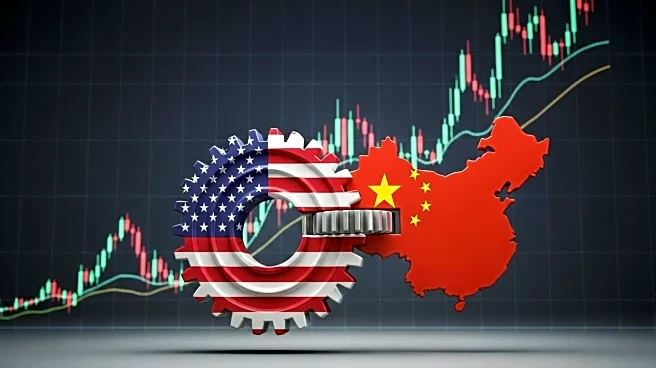What's Happening?
European stock markets are poised for a positive opening on Wednesday, rebounding from a two-week low. The U.K.'s FTSE index is expected to rise by 0.37%, Germany's DAX by 0.4%, France's CAC 40 by 1.72%,
and Italy's FTSE MIB by 0.6%, according to data from IG. This uptick follows recent tensions between the U.S. and China, with President Trump threatening new tariffs in response to China's export controls on rare earth minerals. Additionally, President Trump criticized China for not purchasing soybeans, labeling it an 'economically hostile act' and suggesting potential retaliatory measures such as a cooking oil embargo. Meanwhile, Asia-Pacific markets showed gains overnight, and U.S. stock futures remained stable after a volatile trading session.
Why It's Important?
The anticipated rise in European markets reflects investor optimism despite ongoing trade tensions between the U.S. and China. These tensions have significant implications for global trade dynamics, potentially affecting industries reliant on rare earth minerals and agricultural exports. The situation underscores the interconnectedness of global economies, where policy decisions in one region can have ripple effects worldwide. The suspension of France's pension reform, a key policy of President Macron, also plays a role in stabilizing market sentiment, as it alleviates domestic political pressures. Investors are closely monitoring developments from the IMF and World Bank meetings, which could influence economic policies and strategies globally.
What's Next?
Investors will be watching for further developments in the U.S.-China trade dispute, as any escalation could impact global markets. The IMF and World Bank meetings in Washington may provide insights into international economic strategies and potential resolutions to trade conflicts. Additionally, France's political landscape will be under scrutiny as confidence votes are scheduled, which could affect market stability. Stakeholders in industries affected by trade policies, such as technology and agriculture, will need to adapt to potential changes in tariffs and export controls.
Beyond the Headlines
The ongoing trade tensions highlight the strategic importance of rare earth minerals, which are crucial for technology and defense industries. The U.S.'s reliance on imports for these materials underscores vulnerabilities in supply chains, prompting discussions on diversifying sources and increasing domestic production. The geopolitical implications of trade disputes extend beyond economics, influencing diplomatic relations and national security strategies.










